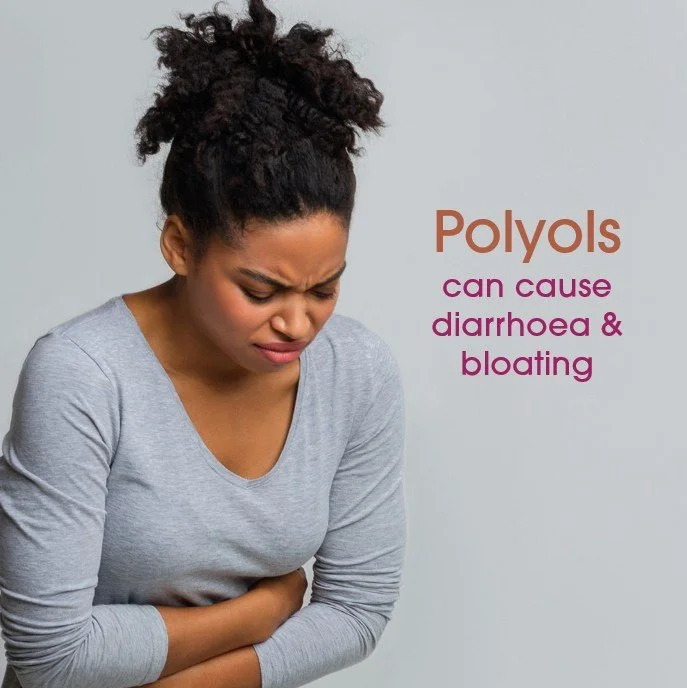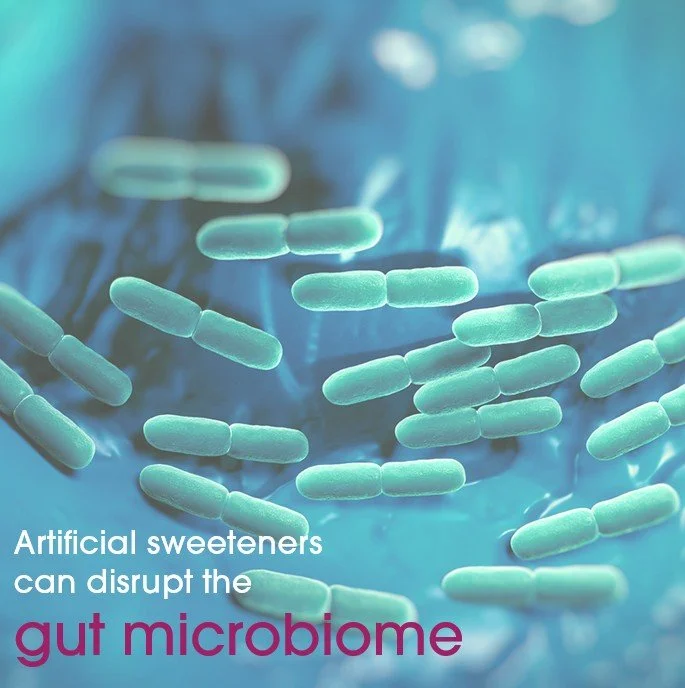Why we don’t use artificial sweeteners
We talk a lot about what goes into the Superflora range of gut health products - see our blogs on the benefits of PHGG and Bacillus coagulans MTCC 5856 to find out more.
What we don’t include is just as important.
This week, we wanted to explain why we don’t use artificial sweeteners in our Shakes, Boosts or Hot drinks and update you on a recent research paper has reinforced that decision.
There are a number of reasons we choose to go natural with our sweeteners.
Buckle up and we’ll take you through it.
Some artificial sweeteners trigger gut symptoms
Many artificial sweeteners are polyols, a type of FODMAP.
Polyols are sugar alcohols that include sorbitol. They are found naturally in some fruit and vegetables. Artificially produced polyols are also added to some foods and are often found in sugar-free chewing gums, mints and lollies.
You can spot them on the ingredient list as sorbitol (E420), mannitol (E421), maltitol (E965), xylitol (E967) and isomalt (E953).
You might also see the following declaration on packaging: ‘excessive consumption may have a laxative effect’ which is a bit of a giveaway that they trigger symptoms.
Why are they a problem?
They are poorly absorbed and osmotically active molecules. That means that they can greatly increase the water content in the small intestine causing painful distension for people with highly sensitive guts.
Polyols that escape absorption in the small intestine, enter the large intestine where they are fermented by gut bacteria. This results in excess gas production causing bloating, farting and altered bowel habits.
Not pleasant.
Potential effects on the microbiome
There is growing evidence that artificial sweeteners may negatively affect gut microbiome health.
A recent review (link below) examined the effects on the gut microbiome of four different types of non-nutritive sweeteners: the artificial sweeteners acesulfame K (Ace-K), aspartame, sucralose and saccharin, plus stevia which is a natural, but highly processed sweetener.
The researchers found that many animal studies report a decrease in beneficial bacteria like Bifidobacterium and Lactobacillus, and an increase in harmful strains such as Clostridium difficile and E. coli, potentially leading to inflammation and gut imbalance.
Disruptions in short-chain fatty acid (SCFA) production and gut hormone signalling have also been observed.
The results of studies in human have been mixed. Some studies have shown that artificial sweeteners can cause dysbiosis and greatly reduce bacterial diversity. For example a clinical trial with healthy young adults demonstrated that consumption of 48 mg of sucralose every day for ten weeks induced gut dysbiosis by increasing Blautia coccoides and decreasing Lactobacillus acidophilus.
However, other human studies have shown milder negative effects than the animal studies or no significant changes. Differences in study design, dosage, shorter exposure time, and sweetener type likely contribute to these varied outcomes.
Whilst the results were mixed, the overall results of these studies have certainly given me pause for thought. Occasional consumption of artificial sweeteners is unlikely to cause problems, but regular daily consumption could. My New Year’s resolution at the start of 2024 was to give up artificially sweetened drinks, and I haven’t looked back!
A longer term study has demonstrated metabolic effects
A recent long term Australian study published in Diabetes and Metabolism highlighted that artificially sweetened drinks carry a risk of type 2 diabetes.
The researchers found that drinking just one can of artificially sweetened soft drink a day may increase the risk of developing type 2 diabetes by 38 per cent. Surprisingly, that risk is even higher than for those who consume sugar-sweetened beverages, such as regular soft drinks, where the risk was found to be 23 per cent higher, although the difference between the two was not statistically significant.
The research was a conducted by a team from Monash University together with RMIT University and the Cancer Council Victoria and followed more than 36,000 Australian adults over nearly 14 years. The findings challenge the common assumption that artificially sweetened beverages are a healthier choice.
The researchers were careful to remove possible confounders including family history, how much physical activity someone's doing, their socioeconomic status, BMI and their sugar intake, and still saw the effect. It wasn’t the case that this group was ‘topping up their sugar’ elsewhere in their diet. The effect was directly due to the artificially sweetened drinks.
Indeed the authors noted that while the link between sugary drinks and diabetes could largely be explained by obesity, the connection between artificially sweetened drinks and type 2 diabetes remained strong even after adjusting for body weight, suggesting a potentially direct effect on metabolism.
This area of research is still evolving but authors suggest some possible mechanisms for the effect. Intake of some artificial sweeteners (aspartame and saccharin) stimulates ‘sweet taste receptors’ that are found in the small intestine (as well as on the tongue). This has a cascade of effects leading to an increase in SGLT1 glucose transporters, which enhances the ability of the gut to transport glucose from the gut into the blood. Further, high habitual intake of saccharin and sucralose (as mentioned above) may disrupt the gut microbiome and can impair glucose tolerance.
The all important taste
Yes, health effects are very important, but so is taste and we don’t like the taste of artificial sweeteners.
They simply taste weird, for example many people find that Acesulfame-K (Ace-K) has a bitter aftertaste.
Similarly, we find that stevia, which technically is a natural sweetener although highly processed, leaves a very strong aftertaste.
We want our products to taste good, so that you are happy to enjoy them daily…and let the gut health benefits accrue.
So, what do we use?
We use natural sugars. In the past we have used a mixture of maple syrup sugar and Australian raw cane sugar. However, we found that supply of maple syrup sugar could be patchy as we wait for ships to bring it from Canada, and it could also have very different characteristics at different times of the year, i.e., soft in winter but frustratingly rock solid in summer. Much to our contract manufacturers delight, we have found a fine grain Australian raw cane sugar and are transitioning to that.
It tastes great. We don’t use a lot, so are products aren’t overly sweet and it lets the other ingredients, such as the cocoa, or real fruit powders shine through. If you want your shake or hot chocolate a little sweeter, we recommend adding a dash of maple syrup.
References:
Hetta, H. F., et al., (2025). Artificial Sweeteners: A Double-Edged Sword for Gut Microbiome. Diseases (Basel, Switzerland), 13(4), 115. https://doi.org/10.3390/diseases13040115
Méndez-García, L. A., et al. (2022). Ten-Week Sucralose Consumption Induces Gut Dysbiosis and Altered Glucose and Insulin Levels in Healthy Young Adults. Microorganisms, 10(2), 434. https://doi.org/10.3390/microorganisms10020434
Kabthymer, R. H., et al. (2025). The association of sweetened beverage intake with risk of type 2 diabetes in an Australian population: A longitudinal study. Diabetes & metabolism, 101665. Advance online publication. https://doi.org/10.1016/j.diabet.2025.101665
Blog written by: Noisy Guts co-founder Dr Mary Webberley. Mary has a background in biology, with two degrees from the University of Cambridge and post-doctoral research experience.





